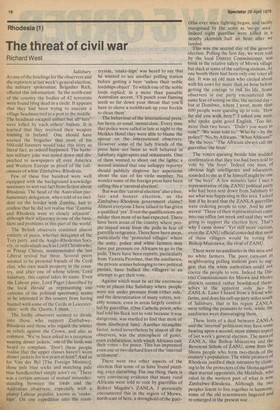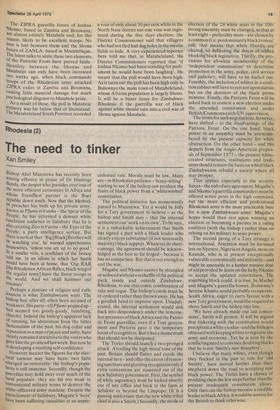The threat of civil war
Richard West
Salisbury At one of the briefings for the observers and the reporters at last week's general election, the military spokesman, Brigadier Rich, offered this information: 'In the north-east of the country the bodies of 42 terrorists were found lying dead in a circle. It appears that they had been trying to execute a village headman tied to a post in the middle. The headman escaped unhurt but all"ters" were killed by each others' bullets. It is learned that they received their weapon training in Ireland.' One should have warned the brigadier that most of his 500-odd listeners would take this story as literal fact, as indeed happened. The harmless military joke was noted down and dispatched to newspapers all over America and Western Europe as proof of the callousness of white Zimbabwe-Rhodesia.
Few of these five hundred were well equipped with the background knowledge necessary to sort out fact from fiction about Rhodesia. The head of the Australian parliamentary delegation, when told of an incident on the border with Zambia, had to confess that he did not realise that 'Zambia and Rhodesia were so closely adjacent', although their adjacency is one of the basic facts and problems in this part of the world.
The British observers consisted almost entirely of peers, whether delegates of the Tory party, and the Anglo-Rhodesian Society, or individuals such as Lord Chitnis who, as Pratap Chitnis, masterminded the last Liberal revival but three. Several peers seemed to be personal friends of the Cecil clan, who own much property in the country, and after one of whose scions, Lord Salisbury, this capital takes its name. Even the Labour peer, Lord Paget (described by the local Herald as representing one extreme of the political spectrum), seems to be interested in this country from having hunted with some of the Cecils in Leicestershire: with the Quorn, I think.
The lordly observers seemed to divide into those who support ZimbabweRhodesia and those who regard the whites as rebels against the Crown, and also as common. 'We've been asked to a reception wearing dinner jackets.' one of the lords was heard to complain. 'Don't these people realise that the upper classes haven't worn dinner jackets for ten years at least? And as for Van der Byl [The Foreign Minister], those pale blue socks and matching pale blue handkerchief simply aren't on.' There was a certain amount of mutual misunderstanding between the lords and the Australian observers, especially with a plump Labour populist, known as 'snakehips'. On one expedition into the coun tryside, 'snake-hips' was heard to say that he wanted to see another polling station before getting a beer 'unless their noble lordships object'. To which one of the noble lords replied, in a more than passable Australian accent, 'I'll punch your flaming teeth so far down your throat that you'll have to shove a toothbrush up your freckle to clean them'.
The behaviour of the international press, has been, as usual, immaculate. Every time that police were called in late at night to the Meikles Hotel they were able to blame the uproar on the international observers. However some of the lady friends of the press have not been so well behaved in Salisbury night-spots and restaurants. One of them wanted to shoot out the lights; a second insisted that one unhappy reporter should publicly disprove her aspersions about the size of his virile member. No wonder some of the foreign press have been calling this a 'carnival election'.
But was this `carnival election' also a free, fair and honest election, as the Zimbabwe-Rhodesia government claims? Almost everyone I have talked to has given a qualified `yes'. Even the qualifications are milder than most of us had expected. There have been areas of the country where people stayed away from the polls in fear of guerrilla vengeance. There have been areas, particularly the 'protected villages' where the army, police and white farmers may have put pressure on Africans to go to the polls. There have been reports, particularly from Victoria Province, that the auxiliaries, the private armies belonging to two political parties, have bullied the villagers in an attempt to get their vote.
Against which must be set the enormous vote in places like Salisbury where people were not under pressure from either side, and the determination of many voters, notably women, even in areas largely controlled by guerrillas. (One Catholic priest, who had told his flock not to vote because it was dangerous, was startled to find that most of them disobeyed him). Another intangible factor, noted nevertheless by almost all the observers, was the atmosphere of gusto, even exhilaration, with which Africans cast their votes — for peace. This has impressed even one or two diehard foes of the `internal settlement'.
There were two other aspects of the election that some of us have found puzzling, even disturbing. For one thing, there is very convincing evidence that many rural Africans were told to vote by guerrillas of Robert Mugabe's ZANLA. I personally encountered this in the region of Mrewa, north-east of here, a stronghold of the guer rillas ever since fighting began, and tacitly recognised by the army as `no-go area'. Indeed eight guerillas were killed in a nearby skirmish half an hour after we landed.
This was the second day of the general election. Polling the first day, we were told by the local District Commissioner, was brisk in the relative safety of Mrewa village but slack at some of the outlying stations. At one booth there had been only one voter all day. It was an old man who circled about with his cows for more than an hour before getting the courage to risk his life. Some observers in our party encountered the same fear of voting on this, the second day — but at Dombwe, where I went, more than 600 people were queuing up to vote. 'How far did you walk here?' I asked one man, who spoke quite good English. 'Too far, more than two hours.' Didn't you want to vote?' We were told to.' Who by — by the police?"No, by Africans.' What Africans?' 'By the boys.' The Africans always call the guerrillas 'the boys'.
The voters queuing beside him nodded confirmation that they too had been told to vote by 'the boys'. Indeed one man, of obvious high intelligence and education, sounded to me as if he himself might be one of 'the boys'. A few minutes later I met a representative of the ZANU political party who had been sent down from Salisbury to see what was happening in this area. I asked him if he heard that the ZANLA guerrillas were ordering people to vote. And he answered: 'Three of their representatives cattle into our office last week and said they were going to support the election here. That's why I came down'. Yet still more curious, even the ZANU official conceded that most of these villagers would be voting for Bishop Muzorewa, the rival of ZANU.
There were no auxiliaries in this area and no white farmers. The poor turn-out at neighbouring polling stations goes to suggest that the white authorities could not coerce the people to vote. Indeed the District Commissioners for Mrewa and Mtoko districts seemed rather bewildered themselves at the apparent volte face by ZANLA. Later I heard from a friend who farms, and does his call-up sixty miles south of Salisbury, that in his region ZANLA were telling the peasants to vote, while the auxiliaries were discouraging them.
These hints of a deal between ZANLA and the 'internal' politicians may have some bearing upon a second, more sinister aspect of last week's general election. The mass of ZANLA, like Bishop Muzorewa and the Reverend Sithole of ZANU, come from the Shona people who form two-thirds of the country's population. The white pioneers of Rhodesia justified their intrusion by claiming to be the protectors of the Shona against their martial opponents, the Matabele, who ruled in the western part of what is now Zimbabwe-Rhodesia. Although the two peoples learnt to live together in harmony, some of the old resentments lingered and re-emerged in the present war. The ZIPRA guerrilla forces of Joshua Nkomo, based in Zambia and Botswana, are almost entirely Matabele and, for this reason, likely to be excellent troops. No love is lost between them and the Shona forces of ZANLA, based in Mozambique. The latest talks to unite these two elements of the Patriotic Front have proved futile. Hostility between the Shonas and Matabeles can only have been increased two weeks ago, when black commando troops of the Rhodesian army attacked ZIPRA exiles in Zambia and Botswana, causing little material damage but much Psychological disgrace to Matabele pride.
As a result of these, the poll in Matabele territory was far below that of Shonaland. The Matabeleland South Province recorded a vote of only about 30 per cent while in the North Nata district not one vote was registered during the five days election: the District Commissioner said that villagers who had not fled had dug holes in the mealie fields to hide. A very experienced reporter here told me that, in Matabeleland, the District Commissioners reported that 'if Joshua Nkomo had been standing for parliament he would have been laughing'. He meant that the poll would have been high. As it turns out the poll has been high only in Bulawayo the main town of Matabeleland, whose African population is largely Shona. It will be a bitter irony for ZimbabweRhodesia if the guerrilla war of black against white should turn into a civil war of Shona against Matabele.







































 Previous page
Previous page